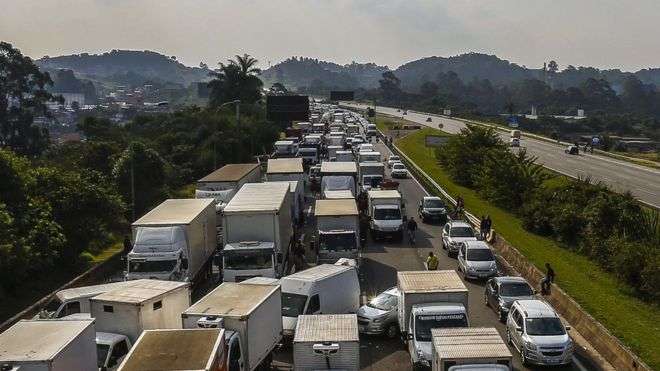He said a radical minority had rejected an agreement reached on Thursday and was holding the population hostage.
The protests have paralysed the country, with queues at petrol stations, supermarket shelves empty and airports running out of fuel.
Diesel prices in Brazil have nearly doubled since 2016.
The city of São Paulo has declared a state of emergency, allowing it to seize fuel from petrol stations.
What does President Temer say?
He said he had authorised federal security forces to clear highways and told state governors to do the same.
A minority of drivers was preventing "many truckers from carrying out their wishes to serve the people and do their jobs", he said.
They "did not have the right to paralyse the nation", he added.
What is São Paulo doing?
Its state of emergency allows city authorities to "seize private goods, such as fuel for example that is stored in a service station", the mayor's office said in a statement.
It also enables purchases to be made without going through normal budgeting and bidding procedures, the statement said.
The move reflects fears that vital services in the city such as bus transport, waste collection, food deliveries and health services could collapse by Monday, the Folha de São Paulo newspaper reported.
The city has suspended non-essential administrative services to save fuel.
Why are truckers protesting?
On Monday they began blockading highways in protest at diesel prices that have nearly doubled since 2016.
On Thursday the government said it had reached a deal to scrap fuel taxes and maintain a 10% reduction in pump prices for a month in return for the protests being suspended for 15 days.
But the trucking group that launched the protests said it did not support the deal.
Abcam, which represents 600,000 drivers, said in a statement that it would not back down until fuel tax cuts were signed into law and told its members to stay "firm" in their protest.
Making the tax cuts law would not be possible until next week at the earliest, Reuters news agency reported.
How widespread are the protests?
On Friday there were still blockades in all but two of the country's 26 states, federal highway police said.
There were 74 alone in the southern state of Rio Grande do Sul, a major route for trade with Argentina.
Routes between cities such as São Paulo, Rio de Janeiro and Belo Horizonte were also still blocked and there was very little activity at Santos, Latin America's biggest port, according to port operator Codesp.
What has been their effect?
Petrol stations have been left unable to offer fuel, supermarkets are short of goods, and rubbish collection and public transport services have been reduced in many areas.
Some firms told staff not to come to work on Friday.
French supermarket chain Carrefour has limited the number of items each consumer can buy.
Fears that the protest might continue for days has prompted consumers to stock up on staples such as bread, rice and mineral water.
Exports have also been affected, as the main highways remain blocked.
Sugar stocks have been reduced to "near zero" in the main ports, according to industry group Unica. Brazil is the world's largest sugar producer.
All car manufacturing in Brazil has been halted, car makers association Anfavea said.
Fibria, the world's largest producer of eucalyptus pulp, said the protests were affecting production.
Why have diesel prices risen?
The state-owned oil company Petrobras adopted a pro-market policy of tracking international oil prices after President Michel Temer took office following the impeachment of Dilma Rousseff in 2016.
That has seen prices almost double.
Shares in Petrobras rose 2% on Friday on news of the deal after dropping by 19% on Thursday.
More about: Brazil
















































